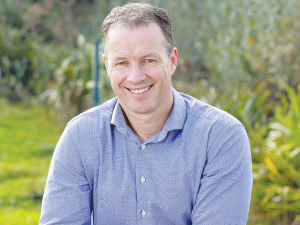DairyNZ opens applications for associate director role
DairyNZ is giving New Zealand farmers a unique opportunity to gain hands-on governance and leadership experience within the dairy sector.
 DairyNZ chief executive Tim Mackle says they are very cognisant of the need to let farmers get on with the job of getting their properties in order first.
DairyNZ chief executive Tim Mackle says they are very cognisant of the need to let farmers get on with the job of getting their properties in order first.
DairyNZ teams are in the field, doing all they can to assist farmers hit by cyclones Gabrielle and Hale.
DairyNZ chief executive Tim Mackle told Dairy News they have been busy updating all the material they have to help farmers through the coming weeks and months.
He says as well as working one on one with farmers, they also plan to continue to run events and discussion groups if farmers want these. But he says they won’t do anything that farmers don’t want and are very cognisant of the need to let them get on with the job of getting their properties in order first.
He says the worst hit areas for dairy are Northland and Gisborne/ Hawke’s Bay and he says of the 1,000 dairy farms in these regions, at least 200 have suffered moderate to severe damage.
“This includes severely impacted pastures, crops such as maize, broken fences, damaged farm buildings and other infrastructure and even herd homes.”
Mackle says there is no road access to 30 dairy farmers in Hawke’s Bay and they have had to dry off their herds which will have a huge financial impact on these people.
He says in Northland about 15 farms have not been able to supply milk for a variety of reasons, including lack of power and damaged dairy sheds. He says issues relating to animal welfare such as mastitis and lameness are potential problems, especially for farmers in Hawke’s Bay where there has huge damage to laneways and paddocks.
Don't Forget Northland
A key message from Tim Mackle is that while the focus is very much on the Gisborne and Hawke’s Bay regions, it is important to not forget about Northland.
He says the damage along the East Coast is disastrous, especially for orchardist and horticulturalists, and the severity of this cannot be underestimated. But he points out that Northland has also been badly hit.
“Some people say that Northland always gets floods, but this was a big one. They didn’t just get the floods, they got the winds as well, which impacted with trees falling on power lines and a lot of people have been without power because of that. It was a fierce storm,” he says.
Mackle says DairyNZ staff will be offering advice and help to all affected dairy farmers, including assisting them by helping them access government financial support to clean up their properties. He says they will be there waiting to help, but not going down driveways to get in the way of farmers in this time of crisis.
He says DairyNZ is working closely with Ministry for Primary Industries (MPI) and other groups such as B+LNZ, Fonterra and Federated Farmers to coordinate their response efforts.
“The last thing we want to do is to duplicate our efforts. Rather, we want to play a different and unique role in helping our farmers,” he says.
More information is on the DairyNZ website www.DairyNZ.co.nz/cyclone
Reflecting on the past year, Horticulture New Zealand chief executive Kate Scott says there has been a lot to celebrate.
Ministry for Primary Industries (MPI) Director General Ray Smith is giving a big shout-out to the horticulture sector, especially kiwifruit.
Early forecasts for New Zealand's apples and pears point to a standout season marked by exceptional fruit quality and high pack-out rates.
Tickets are now available for Beef + Lamb New Zealand’s (B+LNZ) Out the Gate, returning from 19-21 May 2026 at Te Pae, Christchurch.
Dairy Women's Network (DWN) is welcoming AgriHealth as a new partner.
Northland Field Days patron Ross Newlove remembers the inaugural field days he attended 40 years ago.
OPINION: Fonterra may be on the verge of selling its consumer business in New Zealand, but the co-operative is not…
OPINION: What does the birth rate in China have to do with stock trading? Just ask a2 Milk Company.